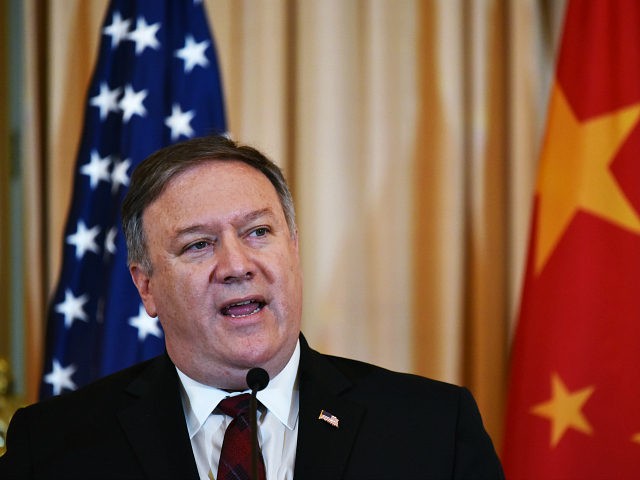U.S. President Donald Trump’s administration hopes to have a peace deal with the Taliban to end the war in Afghanistan “before September 1,” Secretary of State Mike Pompeo said, touting “progress” in the negotiations the day before the terrorist group killed two American service members on Wednesday.
“I hope we have a peace deal before September 1st. That’s certainly our mission set,” he told reporters during an unannounced trip to Kabul on Tuesday.
The top American diplomat also said that the United States is “prepared” to pull out its forces from the nearly 18-year-old war in exchange for Taliban assurances that the narco-jihadis will not shelter other terrorists in Afghanistan, noting that American diplomats are working on the final stages of that plan.
“Regarding terrorism, we have made real progress and are nearly ready to conclude a draft text outlining the Taliban’s commitments to join fellow Afghans in ensuring that Afghan soil never again becomes a safe haven for terrorists,” Pompeo declared.
In October 2001, U.S. troops invaded Afghanistan after the American government learned that the Taliban regime in power at the time was harboring al-Qaeda, the group behind the 9/11 attacks.
U.S. and Taliban negotiators finalized a draft agreement reached in January under the which the terrorist group vowed the prevent other jihadis from operating in Afghanistan in exchange for the withdrawal of foreign forces.
Referring to the draft agreement, Pompeo proclaimed:
In light of this progress, we’ve begun discussions with the Taliban regarding [the] foreign military presence, which today remains conditions-based. And while we’ve made clear to the Taliban that we are prepared to remove our forces, I want to be clear we have not yet agreed on a timeline to do so. This should come as no surprise, but sometimes our adversaries announce things that just aren’t true.
Both sides have been trying to work out the details of the draft plan, including a timeline for the withdrawal of U.S.-NATO-led troops.
Pompeo’s comments came a day after the Taliban killed two Americans, bringing the total number of U.S. military fatalities closer to 2,290, the majority of which took place at the hands of the terrorist group under the previous administration.
The Trump administration has intensified peace-seeking efforts in Afghanistan, making the political reconciliation between Kabul and the Taliban the primary goal of its strategy to end the war.
Taliban narco-jihadis, however, continue to refuse to allow the Afghan government to participate in ongoing negotiations despite offers by President Ashraf Ghani of a ceasefire and official recognition as a political group.
Pompeo told reporters:
All sides agree that finalizing a U.S.-Taliban understanding on terrorism and foreign troop presence will open the door to inter-Afghan dialogue and negotiation. … The United States is laying the groundwork for inter-Afghan negotiations to begin as soon as possible. The objective of those negotiations is for Afghans to agree on a timeline and a political roadmap for reaching a comprehensive peace agreement. It’s not America’s role to dictate the outcome of those negotiations.
The Taliban, which already controls or contests about half of the country, is fighting to establish a sharia-compliant Islamic Emirate in Afghanistan. It considers itself the only legitimate government in the country, dismissing Kabul as an American “puppet.”
The Taliban claims it will only engage in dialogue with Kabul after the full withdrawal of foreign forces. Taliban terrorists have declined U.S. offers to keep a residual American counterterrorism force in the country to ensure the narco-jihadi group keeps its promises to prevent its ally al-Qaeda and rival Islamic State (ISIS/ISIL) from operating in the country.
Despite claims to the contrary by the Pentagon and the Taliban itself, the terrorist group continues to maintain a relationship with al-Qaeda nearly 18 years after the war against the two jihadi organizations began.
American troops removed the Taliban regime from power soon after deploying into Afghanistan. Now, the U.S. has come out in support of Ghani’s offer to recognize the terrorist group as a legitimate political force.
Pompeo noted the peace agreement must address “counterterrorism, foreign troop presence, inter-Afghan dialogue leading to inter-Afghan negotiations, as well as a permanent ceasefire.”
According to the Pentagon, the Afghanistan-Pakistan region is home to the highest concentration of terrorist groups in the world.

COMMENTS
Please let us know if you're having issues with commenting.